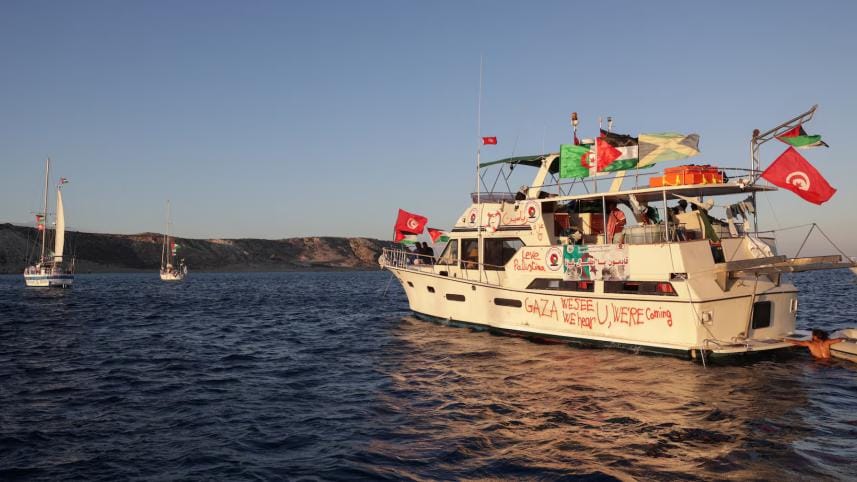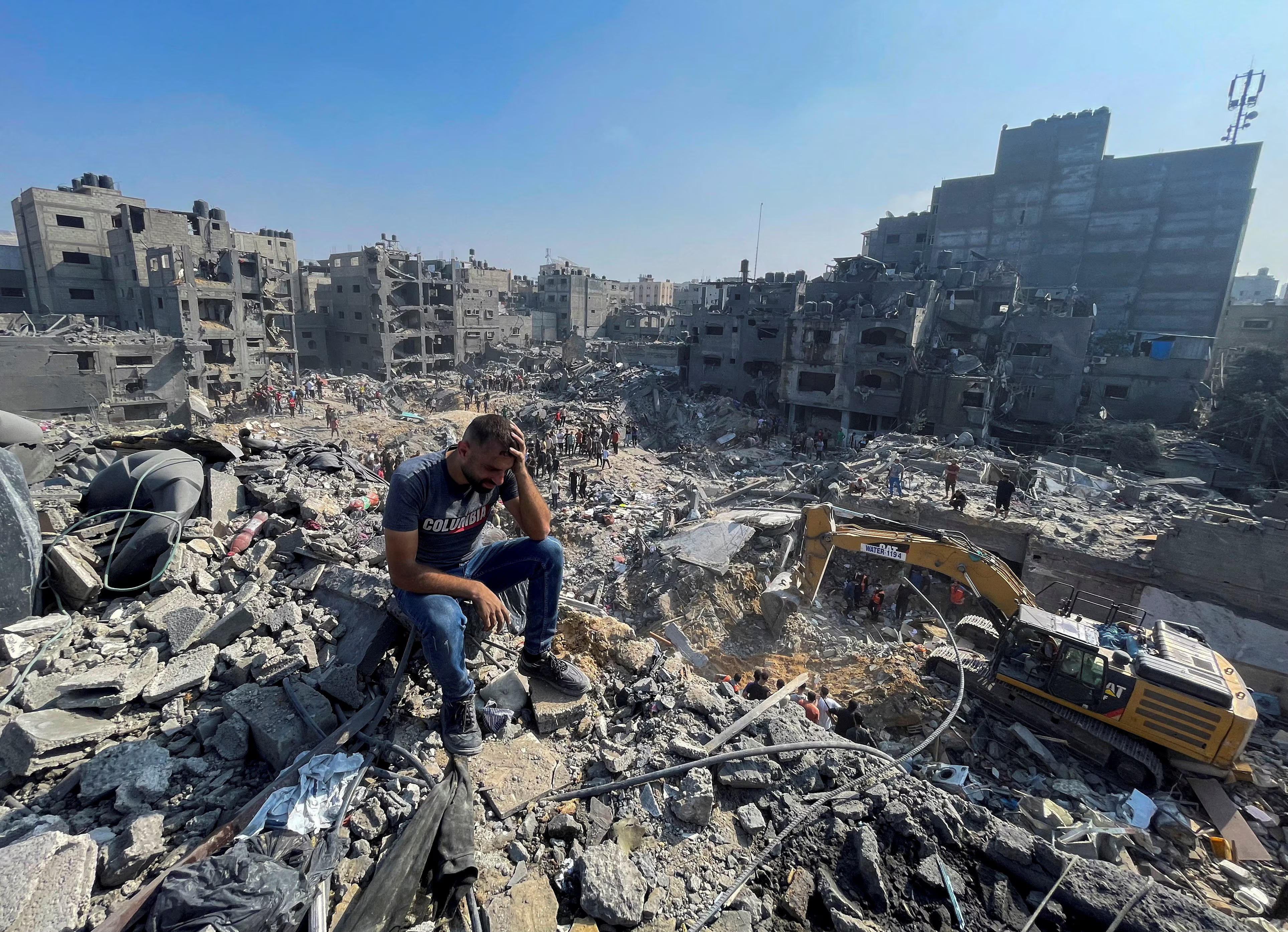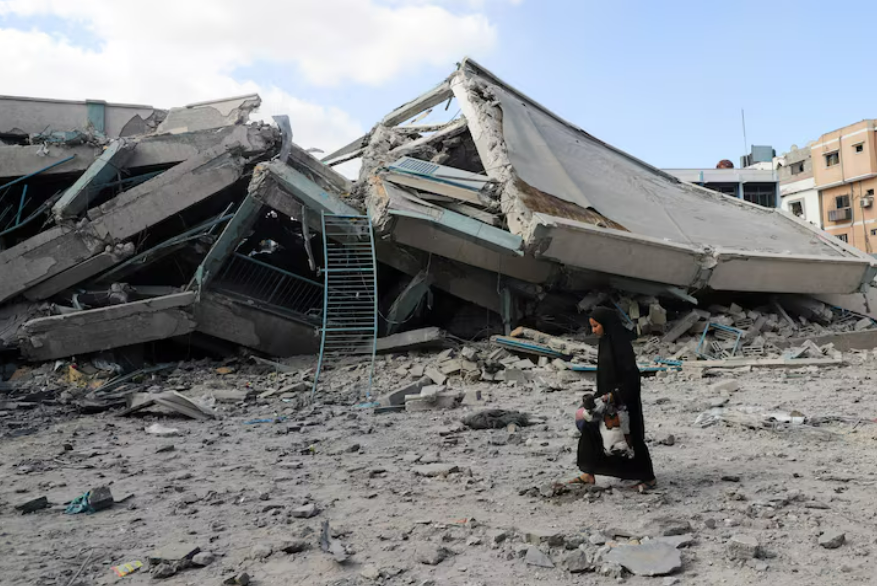Gaza flotilla puts Israel’s blockade on trial

The Global Sumud Flotilla was not a photo op. It was one of the largest aid missions to attempt to break Israel's blockade of the enclave, comprising about 44 vessels carrying some 500 activists from more than 40 countries. Israel intercepted them in international waters and carried out deportations. The organisers lost their boats but gained the spotlight. The question now is what that spotlight obliges the law and the world to do.
It may be recalled that, earlier in June, there was a similar attempt when a single ship—the Madleen—was seized after a brief, well-documented effort to deliver food, medical kits and water equipment. The Sumud effort multiplied that by orders of magnitude and kept sailing despite a dragnet. Even Israel acknowledged that one ship came perilously close to Gaza's waters before being stopped. In terms of movement strategy, that is no trivial difference. It reframed a symbolic stunt into civil resistance at sea.
Israel's legal case rests on the classic law of naval blockade. The San Remo Manual permits capture of neutral vessels suspected of breaching a blockade, even on the high seas, provided conditions are met. Those conditions are not cosmetic. A blockade cannot have the starvation of civilians as its purpose, and it must allow passage of relief supplies essential for survival, subject to search and controlled distribution by a neutral body. That is black-letter law.
There is also a historical precedent that cuts both ways. The United Nations' Palmer Panel once accepted the Gaza naval blockade in principle while criticising Israel's use of force during earlier interdictions. Nonetheless, the Palmer Panel held that a blockade is unlawful if intended solely to starve civilians or if its impact on them outweighs the military advantage gained. The UN Human Rights Council's Fact-Finding Mission took the opposite view, calling the closure a form of collective punishment. The mission concluded that while blockades may be lawful in armed conflict, the Gaza blockade of May 31, 2010, was unlawful, as it caused disproportionate harm to civilians compared with the military advantage anticipated, amounting to a humanitarian crisis. That split is exactly why the Sumud flotilla matters. It forces today's facts into contact with a doctrine written for another century.
Those facts now include binding orders and warrants that did not exist when Palmer wrote. In early 2024, the International Court of Justice (ICJ) ordered Israel to take all measures to prevent acts prohibited under the Genocide Convention and to ensure humanitarian assistance, later requiring an immediate halt to the Rafah offensive and the keeping open of Rafah for aid. These orders are not suggestions. The UN Security Council (UNSC) demanded unhindered humanitarian access in Resolution 2720 and condemned starvation of civilians as a method of warfare in Resolution 2417, then demanded a ceasefire and removal of barriers to aid in Resolution 2728. The UN Independent International Commission of Inquiry has recently concluded that Israel has indeed committed genocide in the Gaza Strip. The International Criminal Court has active arrest warrants for the Israeli Prime Minister Benjamin Netanyahu and former Defence Minister Yoav Gallant, alleging responsibility for the war crime of starvation as a method of warfare, among other crimes. Against that canvas, stopping civilian relief convoys at sea is not a neutral enforcement choice.
But was Sumud a failure because no boats reached the beach? No. If the metric is boxes delivered, yes. If the metric is shifting the legal and political cost curve, the flotilla has already altered the landscape. One vessel reached Gaza waters before being stopped. Dozens approached closer than in previous missions. Hundreds of detainees included elected officials and high-profile figures whose detention triggered demonstrations and diplomatic pressure in many capitals. Every hour of that custody kept the blockade and its human consequences in the news cycle. That is a strategic outcome in itself. Amnesty International has rightly described Israel's interception of the Global Sumud Flotilla as unlawful, highlighting it as evidence of Israel's ongoing intent to deliberately starve Palestinians in Gaza.
What should states do now? Start with first principles. States whose nationals remain detained should insist that any deportations respect due process and consular access. More broadly, member states should operationalise Resolution 2720 by insisting that cargo inspected by an impartial mechanism under UN coordination move by sea to Gaza without political veto. That is consistent with San Remo rules requiring the passage of medical supplies and essentials, and with ICJ orders demanding unimpeded assistance. Arms exports and surveillance support that enable the enforcement of a closure starving civilians should be suspended as a matter of due diligence under international humanitarian law.
How can a future mission actually reach Gaza, given Israeli surveillance and interdiction capacity? Civilian convoys alone will not break a military closure. The next increment is not stealth but legitimacy at scale. A sustainable maritime corridor requires state actors and the UN to intervene. That means flagged governmental or UN-contracted vessels, real-time inspection by an agreed neutral authority, live tracking open to all parties, pre-agreed distribution under the International Committee of the Red Cross or a comparable body, and escorts by non-belligerent navies whose rules of engagement are limited to protection of the humanitarian mission. San Remo provides for the passage of essentials under supervision. The UNSC has the mandate to backstop that with political authority and reporting. Without those guardrails, each brave civilian voyage will run into the same wall.
Moreover, what about the activists from over 40 countries? Their diversity is not window dressing. It creates diplomatic hooks in many capitals and normalises the view that starving a population is beyond the pale. It also tests the seriousness of states that claim to support the ICJ and the UNSC. Furthermore, the broader relevance of Sumud is that it calls time on legal complacency. For years, lawyers debated blockade doctrine in journals while Gaza's lights went out. Now the law is back on the water. The flotilla exposed the distance between elegant theories and the daily reality of a population pushed to the brink. It forced a reckoning that can no longer be outsourced to footnotes. Either the international community enforces the rules it wrote on humanitarian access and the prohibition of starvation, or it admits those rules are for other wars and other peoples. That is the stark clarity Sumud Flotilla delivered.
Barrister Khan Khalid Adnan is advocate at the Supreme Court of Bangladesh, fellow at the Chartered Institute of Arbitrators, and head of the chamber at Khan Saifur Rahman and Associates in Dhaka.
Views expressed in this article are the author's own.
Follow The Daily Star Opinion on Facebook for the latest opinions, commentaries and analyses by experts and professionals. To contribute your article or letter to The Daily Star Opinion, see our guidelines for submission.




 For all latest news, follow The Daily Star's Google News channel.
For all latest news, follow The Daily Star's Google News channel. 

Comments